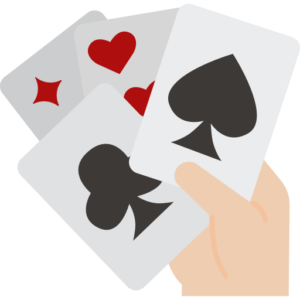Glossary Term
Ring Game
Ring Game
Used In: Poker
Introduction
A ring game in poker refers to a cash game format where players compete using real chips that represent actual money. Unlike tournament play, ring games have no fixed endpoint, allowing players to join or leave the table at their discretion. This flexibility makes ring games popular among both casual and professional players who prefer a more relaxed pace and the option to manage their bankroll on the fly.
In a ring game, the stakes remain constant throughout the session, with players betting and raising according to the agreed-upon limits or no-limit structure. Because the chips hold real value, the strategic focus shifts toward long-term decision-making, managing risk, and exploiting opponents’ tendencies over time. Unlike tournaments, there are no forced eliminations, so the emphasis is on steady profit rather than survival.
Ring games also differ in player dynamics, as the group at the table can change frequently. New players may join mid-session, while others leave when they’ve reached their goals or losses. This fluidity creates a dynamic environment that rewards adaptability and keen observation. Overall, ring games are a fundamental poker format that combines skill, patience, and strategy in continuous cash play.
In Depth Look
Unlike tournaments, ring games have no predetermined end time or structure; players can join and leave the table whenever they choose. This freedom makes ring games highly flexible and accessible for players who want to control their session length and bankroll exposure. The stakes remain fixed during the game, which allows players to focus on steady, long-term profit rather than racing against a clock or other players’ eliminations.
Strategically, ring games demand a different approach compared to tournaments. Since players can reload chips at any time and the blinds remain consistent, risk management and chip preservation become vital. Players must consider factors such as opponent tendencies, position, and stack sizes over a longer stretch of hands. The ability to buy in and cash out at will changes the incentives: players can afford to be more patient and selective with their hands, aiming for consistent gains instead of high-variance moves often seen in tournament play.
Player dynamics in ring games are also fluid, as the table composition may change frequently. New players might enter mid-session, while others exit after reaching their win or loss limits. This constant turnover requires adaptability and sharp observation skills to adjust strategies against unknown opponents. Because ring games are foundational in both casual and professional poker, mastering their unique characteristics is essential for any serious player seeking sustained success in cash play.
Key points:
- Ring games are cash games with real money chips and no fixed end time.
- Players can join or leave anytime, allowing flexible session lengths.
- Stakes remain constant, focusing strategy on long-term chip management.
- Risk management and opponent observation are critical due to the open-ended structure.
- Player turnover requires adaptability and awareness of changing table dynamics.
- Ring games emphasize steady profit over survival or knockout strategies seen in tournaments.
Mechanics
In poker, a rebuy allows a player to purchase more chips after losing all or most of their stack, but only during a set time in certain tournaments. This structure creates a dynamic early phase where players can play more aggressively, knowing they have a safety net. Rebuys usually cost the same as the original buy-in and provide the same number of chips. Some players treat the rebuy period as a chance to build a big stack quickly, while others take a conservative approach to avoid spending more money.
Once the rebuy period ends, the tournament shifts to a freezeout format—if a player busts, they’re out. Some events also offer an add-on, which is a one-time chip purchase available at the end of the rebuy period, regardless of a player’s current stack size. These formats often lead to larger prize pools and more varied strategies. Players must weigh the value of staying in the game against the extra cost and decide how much risk they’re willing to take early on.
Key points:
- Rebuys are only allowed during a specific time frame in certain tournaments.
- Players can use rebuys to play aggressively or build a deeper stack.
- Add-ons give players one last chance to boost their chips before freezeout play begins.


Illustrated Example
In a typical ring game hand, the dealer button rotates clockwise after each hand, moving the small blind and big blind positions accordingly. For example, imagine a $1/$2 No-Limit Hold’em ring game with six players seated around the table. The player to the immediate left of the dealer posts the small blind ($1), and the next player posts the big blind ($2). Each player is then dealt two private cards, and the first betting round begins with the player to the left of the big blind. This player can fold, call the $2 big blind, or raise to a higher amount. Betting continues clockwise until all active players have matched the highest bet or folded.
As the hand progresses, community cards are dealt in stages: the flop (three cards), the turn (one card), and the river (one card). After each stage, another betting round occurs with players choosing to check, bet, raise, call, or fold based on their hand strength and position. Because chips have real cash value in ring games, players often approach each hand with careful risk management. At the end of the hand, the remaining players reveal their cards in a showdown to determine the winner of the pot. Players can leave the table or rebuy chips at any time, making ring games a flexible and continuous form of poker.
| Term | Description |
|---|---|
| Dealer Button | Rotates clockwise after each hand, indicating the nominal dealer and position order. |
| Small Blind | Forced bet posted by the player immediately left of the dealer, usually half the big blind. |
| Big Blind | Forced bet posted by the player two seats left of the dealer, sets the minimum opening bet. |
| Betting Rounds | Sequential rounds of betting before and after community cards: pre-flop, flop, turn, and river. |
| Rebuy/Reload | Option for players to purchase more chips and continue playing after losing their stack. |
| Showdown | The final phase where remaining players reveal cards to determine the pot winner. |
Player Perspective
Ring games offer a unique balance of flexibility and strategic depth. Because players can join or leave at any time, they have control over how long they want to play and how much money they risk. This makes ring games appealing to both casual players looking for relaxed sessions and professionals who want to manage their bankroll carefully. Players often focus on reading opponents’ tendencies over multiple hands, since the game’s continuous nature provides ample opportunity to gather information and adjust strategies accordingly.
Additionally, the stable blind structure and cash-based chips encourage a patient, long-term approach to the game. Unlike tournaments where survival pressure can force aggressive or high-variance plays, ring game players prioritize steady profit and minimizing losses. The ability to rebuy and reload chips also affects decision-making; players might take calculated risks knowing they can replenish their stack if needed. Overall, ring games demand discipline, observation, and adaptability, making them a challenging but rewarding format for players who enjoy a thoughtful and ongoing poker experience.
Conclusion
Ring games represent one of the most fundamental and widely played forms of poker, combining flexibility with strategic depth. Their continuous nature, stable stakes, and real-money chips create an environment where skillful play, patience, and adaptability are rewarded over time. For players seeking a balanced mix of control and competition, ring games offer a dynamic platform to hone poker skills and pursue steady, long-term profit.
Whether you’re a casual player looking for flexible sessions or a professional focused on consistent earnings, understanding the mechanics and player dynamics of ring games is essential. Mastery of this format lays a strong foundation for success in all areas of poker, making ring games a crucial part of any player’s journey.
The Top Online Casinos for Playing Poker
These platforms prioritize player satisfaction by providing intuitive interfaces, seamless gameplay experiences, and robust security measures to ensure a fair and enjoyable environment for all users.
No results were found!


Author
Branimir Ivanov | Senior News Contributor





